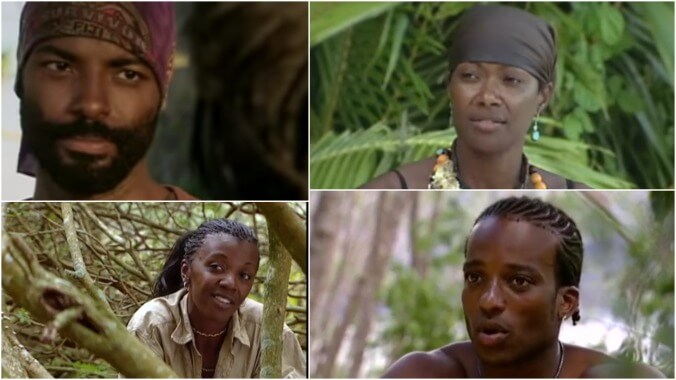"I was called the N-word": Black Survivor all-stars reveal racism behind the scenes

For the 18 years since he competed on Survivor: Marquesas, Sean Rector yearned to provide a forum for Black reality stars to speak out about their treatment while filming, and their portrayal on screen. “Usually when we would describe them individually, it would seem like it wasn’t valid,” explains Rector, who says he received death threats after his season aired in 2002. “I just figured if the world could all see us together and see the through line… that the [reality show producers and editors] would take caution and have a little more concern as to how the editing goes, and even the opportunities that follow after.”
Rector finally brought his vision to life on Wednesday when he helped fellow Survivor alum and podcast host Rob Cesternino gather a panel of twelve Black Survivor players for a Zoom video chat and recording of Rob Has A Podcast. Cesternino and his co-host Teresa “T-Bird” Cooper (Africa, season 3) were joined by Rector; Ramona Gray Amaro (Borneo, season 1); Clarence Black (Africa, season 3); Ted Rogers Jr (Thailand, season 5); Rory Freeman (Vanuatu, season 9); Jolanda Jones (Palau, season 10); Sherea Lloyd (China, season 15); Phillip Sheppard (Redemption Island, season 22 and Caramoan, season 26); Sabrina Thompson Mitchell (One World, season 24); Julia Carter (Edge Of Extinction, season 38); and the first two of Survivor’s four Black winners, Vecepia Towery (Marquesas, season 4) and Earl Cole (Fiji, season 14).
Over 2 hours and 15 minutes, the group discussed how racism and racial bias affect Black contestants’ entire Survivor experience. “I’m not complaining. I’ve been Black all my life,” says Jolanda Jones. “But I’m telling you, it starts before, it’s on the island, it’s afterward.” Her comments were echoed by Earl Cole: “We go on this adventure just like everybody else, but we don’t even go with the same freedom because we’re carrying something else. And that’s part of our game, and it sucks that we have to do that. So when we win or get to the end, man, that is a testament that we actually had to be another person to be accepted, once again, to make it all the way to the end. And then most of the time we get voted out first or second anyway. Why? Because we look different? I don’t know. Who knows what it is? Oh yeah, racism.”
See the full video here, and read some excerpts below.
Earl Cole didn’t watch the season prior to his—Survivor: Cook Islands, which split the contestants onto four teams based on their race—but he heard the tribe of Black contestants “imploded,” so he went into Fiji very vocal about taking all Black people to the end with him. And he succeeded: The final three of the season were all Black contestants—the only time that’s happened in 40 seasons. Cole thought the moment would be celebrated. It was not. Though he was booked on a few outlets like BET’s 106 & Park, he felt production could have sought out more opportunities to market the show to Black audiences.
I thought CBS would use this as an opportunity to actually try to get more Black viewers… I figured I was liked well enough on the show, maybe [they’d] market it a little bit. Nothing happened. They did nothing for me. They didn’t promote me in any kind of way. They had a system in place… you do all these interviews, and there were these country stations, rock stations, all these things like that, and I was like, “I live in LA. What about Power 106 and the Stevie Wonder station”—all these other stations they didn’t even try to get me on to just try to pull more people in.
Though he was invited to and attended Survivor’s 10th anniversary party at the end of season 20 in 2009, Cole expressed frustration at not feeling more included as Survivor alum.
The main thing for me, I was never invited to any finales. I live in LA and the finale was right here. There would be other people from the past there, winners after me there. Not one invitation, not one…. I didn’t understand what that was about. I had already spoke about this to [host Jeff Probst] before about the things we went through, because—don’t get it wrong—when we had an all-Black finale, where your only choice is to “bet on Black,” I had to hear it all. They were hating left and right. People hated our season. And then Jeff publicly said he didn’t like our season, which doesn’t help. I thought that was socially irresponsible. So you’re going to say you hate Fiji of all seasons, where it’s an all-Black finale and the first African American male wins? So you’re going to tell all the fans, “I hate that season”?



























![Rob Reiner's son booked for murder amid homicide investigation [Updated]](https://img.pastemagazine.com/wp-content/avuploads/2025/12/15131025/MixCollage-15-Dec-2025-01-10-PM-9121.jpg)












